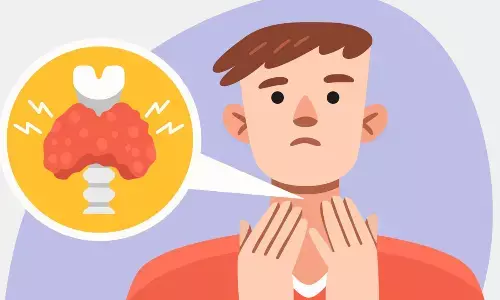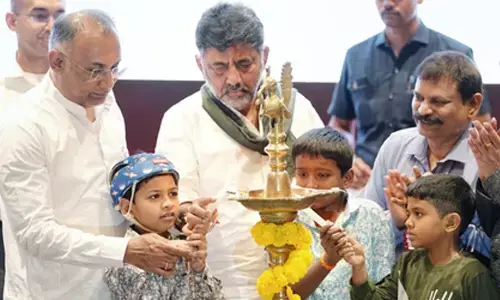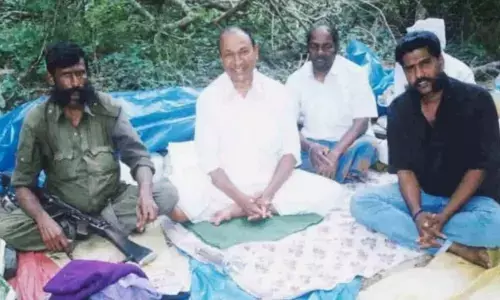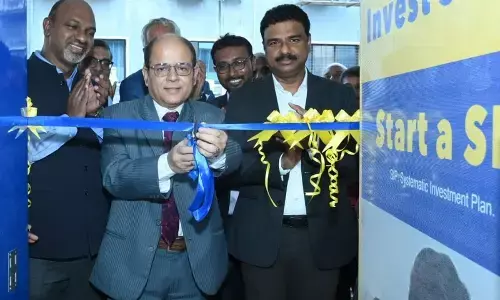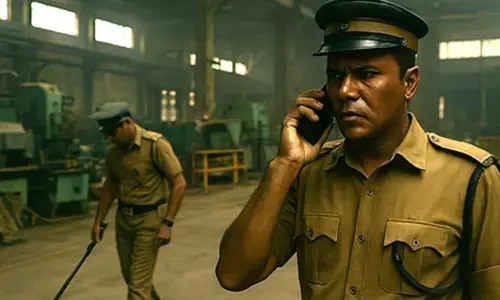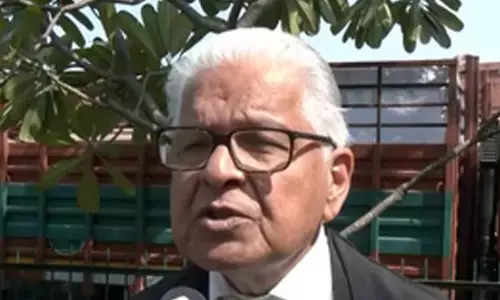Telugu States just lost control over Krishna, Godavari waters
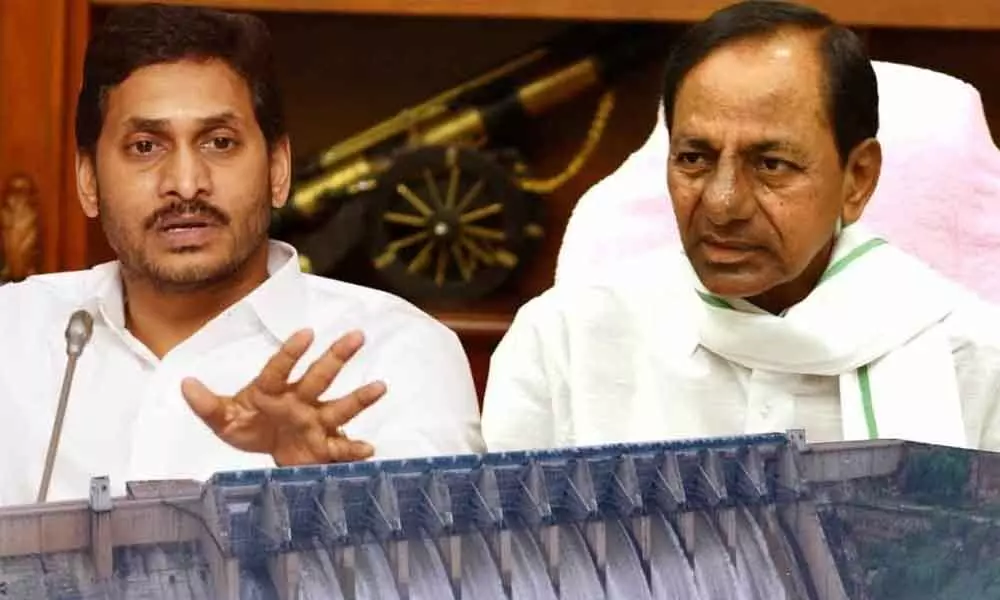
Jagan Mohan Reddy and KCR
Instead of resolving issues, both CMs stuck to their guns, which cost dearly
As expected, the Government of India issued a notification on 16th July 2021. This is a sledgehammer on the heads of both the CMs of Telangana and Andhra. Both may sulk, but they have to realise that now they lost both Krishna and Godavari basin to Government of India and its appointed boards under its direct supervision. Not a single Telugu person from both the States will be part of it.
It was great opportunity for GoI, and it used it well. Remember that Telugu saying – pittal panchayati pilli parskarinchindi. Not only pilli came out with the solution but asking to deposit money for what it (pilli) thinks is the solution not only for what they are fighting (Krishna water) but what they might fight in future (Godavari water).
What is this dispute anyway? Chief Ministers of two Telugu states, out of lockdown boredom, wanted to do something adventurous. They wanted to get more water – which is not there – by fighting. Andhra and Telangana are not the first states to fight over water, but probably, they are the first ones to lose control over not just on what they are fighting, but on other river basins too.
Nature of the dispute What is this dispute anyway?
Water-sharing disputes are neither new to India nor unique to Telangana and AP. There are root causes for these fights, which are outside of these two states purview: a) Outdated concepts: water allocations are being made with outdated and unscientific concept called 75% or 65% dependability; b) Climate variability: Such allocations do not factor in variability of the water from year to year and within a year; c) No independent enforcement: even if such allocations are to be believed, there is no independent mechanism to enforce; d) No guidelines on inter-basin transfers withing the state: Once a state gets water from one basin, it can deny to the region within that particular river basin and divert to other areas causing disputes within the state; e) No incentives to use less water: currently there are no incentives for using less water while meeting the same economic goals; F) no mechanism to share the benefits rather than water itself; All these factors are underlying reasons for this current conflict between AP and Telangana which emanate from our national policy and legal framework.
Specific situation
The Krishna Water Dispute Tribunal, KWDT-II, just before AP state was divided into two, allocated water to three riparian states – Maharashtra, Karnataka and combined state of AP. Out of that allocation, the combined AP state got 1,005 tmcft of water. This has to be shared between Telangana and AP. Telangana state has 68% of Krishna basin area and AP has 32% basin area. A process was initiated by GoI to allocate the water to Telangana and AP from the combined allocation but could not produce any consensus due to various historical and complex procedural wrangling. This is now the source of conflict. Today after seven years, Telangana and AP do not have clarity on their share of Krishna water. So, Telangana wants equal share of this 1,005 tmcft, and Andhra Pradesh wants to divert more water to other basins through Srisailam, which was a reservoir to produce electricity. Both the CMs told their people that they are fighting for their rights.
The escalation
One side Telangana is demanding equal share over Krishna water and on the other side, AP issued a Government Order (GO) No. 203 on 5th May 2020 to further increase the water diversion to another basin from Srisailam reservoir. This is to increase already the existing diversion from Pothireddypadu regulator from 3 tmcft per day to almost 9 tmcft per day. According to Telangana state, the existing 3 tmcft itself is 'illegal' since Srisailam dam was meant for hydro power generation.
Alarmed by the GO. 203 of AP, Telangana, after the Cabinet meeting on 19th June 2021, announced a series of projects upstream of Srisailam, which according to AP might reduce flows into Srisailam. That did not stop there, in July first week, Telangana started producing electricity emptying the water from reservoirs, with view to putting pressure on AP. Both states instead of sitting and discussing went wild, giving an opportunity to Government of India to intervene.
The conflict can be easily resolved. For that both the state CMs or their representatives could have quietly sat and worked out a framework. The authors of this article made a detailed study using daily inflows, outflows, water used for power generation, water diverted to other basins and came out with very interesting findings. For that, there is a need for scientific understanding of flows, variability based on actual data. It is not a zero-sum game; it is not that one state gain is loss to other state. But such fights are not about water, well that is different debate altogether.
Can GoI move resolve row?
The answer is yes and no. before we get into that, let us look what the 16th July notification
The salient points are as follows:
t From 31st October onwards, both the State governments have no role in any of the water resource infrastructure on Krishna, Godavari river basins about "Administration, regulation, maintenance, operation." These activities will be under the direct control of the Board, which means, Government of India
t Both the Governments have to take approval of ongoing projects, which are not "approved" and the new projects which they want construct in future.
t Even if some projects which are completed but not approved, will not be in operation if the board thinks that they are not proper projects
t Even if the old projects such as Nagarjunasagar, it is up to the board to release water as part of their regulation, maintenance and operation
In one sentence, both Telangana and Andhra CMs and their irrigation and hydropower generation will be under direct control of the Board, which is GoI. Not a single Telugu person from both the states will not there in decision-making on two vital sectors of the states. The irony is that both the CMs were fighting over greater control, but they not only lost on Krishna river basin infrastructure, but on Godavari basin too.
Is it good or bad thing?
It depends whom we are asking. For farmers who are main stakeholders there may not be much difference. For them, at least they may have some certainty about water releases etc. There used to be always some tamasha before releasing of water, now that will be out of State governments and their machinery. However, the operational details are being worked out by GoI and they will be known in the next 30 days
What can both States do?
Well both the State governments are responsible for getting into this situation. It is highly unlikely that both CMs and their government operates will do anything except complaining. Their petty fight and their perception of the fair share of water got them into this situation. GoI couldn't have asked for better opportunity to push their bigger and broader agenda of bringing water into the Central list.
Next week most likely the electricity bill will be approved by Parliament giving total control over electricity distribution, pricing and to companies and giving choice to consumers. Basically, state governments will have no role whatsoever in electricity in coming years. Telangana and Andhra states through their fight opened another area, water, for Government India to take over. This notification will have far-reaching implications to the water sector not just in these states but in entire country in coming years. Soon, water will be in the Centre list. For now, from 31st October in Telangana and Andhra Pradesh, water is effectively central subject.
But what can both the governments do? First, they need to come together and agree on how they are going to resolve and better manage the water infrastructure. Both need to come together and agree for a mutually respectable framework and present it to Supreme court jointly to get out of this situation.
Will two states do this quickly before 31st October and go to Supreme Court challenging the notification on 16th July 2021? That is the question the civil society of both the states should be asking. Obviously, they will not do it. So, it is better both the state governments and the civil society better prepare for the new reality.
Only old Telugu saying can sum it up – konda nalikaku mandu pedite, unna nalika udipaye.
(Dr Biksham Gujja is international expert on water policy. He earlier worked with WWF, UN, ICRISAT and edited a book on "Water Conflicts in India" among many articles and books. Dr Shiva Kumar is scientist and analyst who earlier worked with Department of Atomic Energy)


